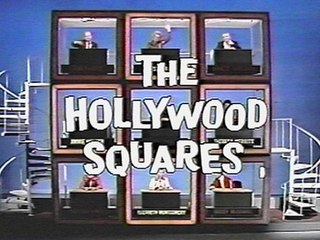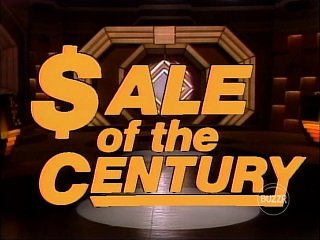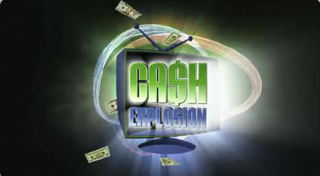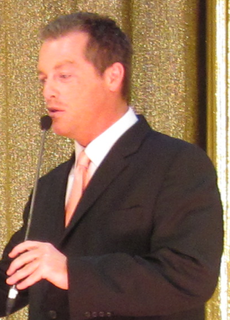
Hollywood Squares is an American game show in which two contestants play tic-tac-toe to win cash and prizes. The show piloted on NBC in 1965, and the regular series debuted in 1966 on the same network. The board for the game is a 3 × 3 vertical stack of open-faced cubes, each occupied by a celebrity seated at a desk and facing the contestants. The stars are asked questions by the host, and the contestants judge the truth of their answers to gain squares in the right pattern to win the game.

Greed is an American television game show that was first broadcast on Fox in November 4, 1999 and last broadcast on July 14, 2000 with the total of 44 episodes in one season. Chuck Woolery was the show's host, with Mark Thompson serving as a primary announcer. The game consisted of a team of contestants who answered a series of multiple-choice questions for a potential prize of up to $2 million. The program's catchline is "The Richest Most Dangerous Game In America".

Win Ben Stein's Money is an American television game show created by Al Burton and Donnie Brainard that aired first-run episodes from July 28, 1997 to January 31, 2003 on Comedy Central. The show featured three contestants who competed to answer general knowledge questions in order to win the grand prize of $5,000 from the show's host, Ben Stein. In the second half of each episode, Stein participated as a "common" contestant in order to defend his money from being taken by his competitors. The show won six Daytime Emmy awards, with Stein and Jimmy Kimmel, the show's original co-host, sharing the Outstanding Game Show Host award in 1999.

Sale of the Century is an American television game show that debuted in the United States on September 29, 1969, on NBC daytime. It was one of three NBC game shows to premiere on that date, the other two being the short-lived Letters to Laugh-In and Name Droppers. The series aired until July 13, 1973, and a weekly syndicated series began that fall and ran for one season. Actor Jack Kelly hosted the series from 1969 to 1971, then decided to return to acting full-time. He was replaced by Joe Garagiola, who hosted the remainder of the daytime series plus the one season in syndication.
The Joker's Wild is an American television game show that has aired at different times since the 1970s. Contestants answer questions based on categories determined randomly by a mechanism resembling a slot machine. The show's title refers to the game's slot-machine mechanism also having jokers.
Monopoly is an American television game show based on the board game of the same name. The format was created by Merv Griffin and produced by his production company, Merv Griffin Enterprises.

Whammy! is an American television game show that aired new episodes on Game Show Network from April 15, 2002 to December 5, 2003. The main goal of the game is to earn as much money and prizes as possible through collecting spins by answering trivia questions correctly, then using those spins on a gameboard to win various prizes and cash amounts while attempting to avoid the show's eponymous character, the "Whammy." Contestants who do land on a Whammy lose all their prizes accumulated to that point; four Whammies eliminates a contestant from the game. The program is an updated version of Press Your Luck, which originally aired on CBS in 1983–86. The series was taped at Tribune Studios and was hosted by Todd Newton, with Gary Kroeger announcing.

Winning Streak is an Irish television game show, Europe's second longest-running after the UK's Countdown. Aired weekly in Ireland, five contestants play a number of games to win cars, holidays, and cash prizes up to €1,000,000. Broadcast on Saturday nights between September and June on RTÉ One, the game show is among the channel's most popular programmes, often ranking among the top five in the ratings. However, there was a significant drop in viewership in the 2008/2009 series. The show began on 21 September 1990, and has been hosted by popular television personalities Mike Murphy (1990–2001) and Derek Mooney (2001–2008). Prize money for the show is funded by the National Lottery, with entry to the game based on National Lottery scratchcards.

Flamingo Fortune is an American game show for the Florida Lottery that aired from 1995–1999. It was originally produced by Mark Goodson Productions, at the time also producing game shows for state lotteries alongside his regular game shows. After the first five shows, production was transferred to Jonathan Goodson Productions, after All American Television spun out their lottery game shows to Mark Goodson's son, Jonathan Goodson. Production would later transfer to Columbia TriStar Television and Game Show Network from 1997 to 1999. The program was taped at Universal Studios Florida near Orlando, Florida.
Deal or No Deal was an Australian game show that aired on the Seven Network between 2003 and 2015. It was the first international version of the game show, after the original Dutch version. It was the first of the versions to use the Deal or No Deal name. The show was recorded at the studio facilities of Global Television located in the Melbourne suburb of Southbank. The top prize of $200,000 was won by four contestants.
Illinois Instant Riches is a lottery game show airing in the state of Illinois, as well as nationally on Chicago-based Superstation WGN-TV. The show was hosted by Mark Goodman, with Linda Kollmeyer as his co-host and Bill Barber as announcer.
Sale of the Century is a British game show based on a US game show of the same name. It was first shown on ITV from 9 October 1971 to 6 November 1983, hosted by Nicholas Parsons. Special edition Celebrity Sale of the Century aired occasionally, starting on 2 January 1981 with Steve Jones as a host. The first series was supposed to air only in the Anglia region, but it rolled out to other regions since 8 January 1972 and achieved full national coverage by the end of 10 May 1975, at which point it was one of the most popular shows on the network – spawning the often-mocked catchphrase "and now, from Norwich, it's the quiz of the week." Since Norwich was considered something of a backwater compared to London, it was often used ironically.
Deal or No Deal is a game show which was aired in Singapore on MediaCorp Channel 5 and MediaCorp HD5 for two seasons. The show premiered on 13 May 2007 with a million dollar deal show series from Sunday to Wednesday, after which the show aired every Wednesday at 8:30pm. The show is hosted by Adrian Pang.

Cash Explosion, known as Cash Explosion Double Play from 1989 until 2012, is an official Ohio Lottery TV game show, which is broadcast on television stations throughout Ohio. The show originated in Cleveland and is now taped by Mills James Productions in Columbus, Ohio. Cash Explosion originally aired from February 7, 1987 to September 30, 2006, at which point the Ohio Lottery replaced it with Make Me Famous, Make Me Rich. However, slumping ticket sales and poor ratings prompted the return of the Cash Explosion format a year later, on October 6, 2007, and it has remained on the air since.

Break the Bank is an American game show created by Jack Barry and Dan Enright and produced by their production company Barry & Enright Productions. It was the first game show produced by Barry and Enright as a tandem since their fall from grace following the 1950s quiz show scandals.

Bingo America is an American game show broadcast by Game Show Network. The series follows two contestants as they try to compete to win up to $100,000. Additionally, the series lets at-home viewers print bingo cards online that allow them to play along with the show to win small amounts of money for themselves.
NY Wired was a lottery game show aired from 1997 to 1999. The weekly show was produced by Jonathan Goodson Productions in association with the New York Lottery. For its first season, it was also co-produced by DDB Needham. The show was canceled in mid-1999 due to low ratings.
Family Game Night is an American television game show based on Hasbro's family of board games and EA's video game franchise of the same name. The show is hosted by Todd Newton. Burton Richardson announced for the first two seasons, until he was replaced by Stacey J. Aswad for the third season, and then Andrew Kishino beginning in the fourth season. The 60-minute program debuted on October 10, 2010 on the new channel, The Hub, formerly Discovery Kids. The network would become Discovery Family on October 13, 2014; it was previewed on October 9, 2010 on its sister channel, TLC. Seasons 1 through 3 each contained between 20 and 30 episodes. Seasons 4 and 5 each contained 15 episodes. Season two premiered on Friday, September 2, 2011, and new games were added. The games added to the second season included Cranium Brain Breaks, Green Scream, Ratuki Go-Round, Simon Flash, Operation Sam Dunk, Trouble Pop Quiz, and Spelling Bee.
Minute to Win It: Singapore Edition is a Singaporean primetime game show that originally ran on MediaCorp Channel 5 with host Bryan Wong. The show is part of an international franchise, Minute to Win It. Contestants take part in a series of 60-second challenges that use objects that are commonly available around the house. Contestants who managed to complete all 10 challenges will win S$250,000. The first episode airs on Saturday, 8:20pm, right after the live telecast of the nation's 49th National Day Parade. Subsequent episodes were telecast on every Wednesday beginning from 13 August 2014 at 8:00pm.













